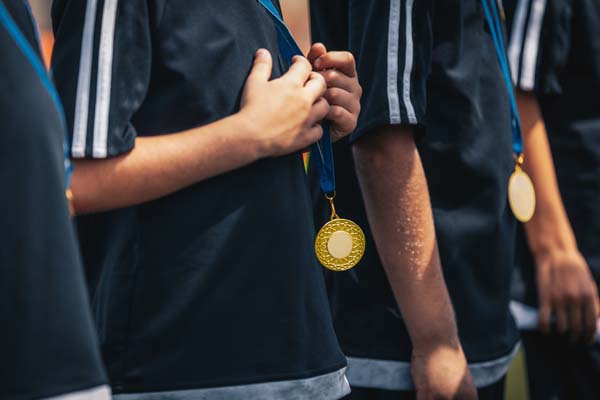It is widely understood nowadays that academic success is not the be-all and end-all for children’s futures. As a result, there is a lot more emphasis on ensuring that children develop into well-rounded citizens with different skills and interests. So, many schools and parents are making an effort to offer-up extracurricular activities to students ranging from sports and STEM to art and public speaking.

To learn more, Doha Family spoke to a few local school students about their extracurricular activities and how they affect them. We also discuss whether all students can benefit from them.
Amudhaa Selvan
Amudhaa Selvan, a grade 10 student from Birla Public School, has always had a calendar packed with extracurricular activities. “It started from grade two when my parents got me enrolled in football club,” he recalls. Since then, he has been involved in swimming, badminton, and karate. But it’s not just sports—Amudhaa has also started taking up coding in hopes that it will help him achieve his dream of working in Robotics.
When speaking about the effects of participating in different activities, Amudhaa says: “I have enjoyed going out, meeting people from different cultures, making new friends and yes, learning something new every day.”
In addition to learning new skills, Amudhaa believes that trying out these different activities has helped him understand his potential. He also believes that they have improved his cognitive abilities by helping him respond more quickly to tasks and enhancing his mental calculation abilities.
Like many students, Anudhaa’s involvement in extracurricular activities has helped him discover and improve multiple positive qualities. Themes like developing increased discipline and self-control, an ability to accept failures and celebrate success, becoming a better team player, and developing better time management skills seem universal. Besides strengthening character, these qualities could potentially help school children enhance their social skills and gear them up for their professional lives, as Amudhaa’s story shows.
Gouri Shankar S and Gouri Nanda S
Siblings Gouri Shankar S (grade 10) and Gouri Nanda S (grade nine), who study at Ideal Indian school, share how their lives changed after taking up cricket and swimming, respectively. “It’s been four years,” they say. Shankar, for starters, says that playing cricket has helped him understand the value of physical and mental health and his ability to face difficulties. “Joining cricket club has not only improved my game but has instilled a lot of self-discipline in me and has made me tough inside out. I am ready for forthcoming challenges in life.”
These effects have also spilt into his classroom life, as Shankar attributes his increased confidence in maths and physics to the sport. “Cricket club has made me shed my inhibitions and helped me become more confident.”
On the other hand, Nanda has noticed a general change in her lifestyle. She proudly observes: “Swimming has helped me build stamina and motivated me to be physically fit. Not just that—my commitment to it has also changed my eating habits. It’s mostly healthy [meals] now.” Remarkably, Nanda used to fear the water, but four years of intense training sessions in the pool have transformed her relationship with it. And overcoming this fear has taught her a valuable lesson: “Fear is only there [as long as] you don’t know. Knowledge dispels fear—fear of any kind, fear of anything, fear in any form.” Like Shankar, she, too, feels like she can confidently face any challenges that cross her path and swimming has given her the mental and physical capacity to do that. “Swimming has instilled agility in me. It will be my lifelong partner.”
Sahas Reddy
Sahas Reddy, a grade six student from Birla Public School, believes that his involvement in various art and crafts and dancing workshops has transformed him. Unlike the others, he attended both physical and virtual sessions, but the effects have been just as significant. For starters, Reddy found himself making a greater effort to dress more neatly and work on his presentation. “Confidence is the greatest achievement,” he opines. His newfound self-confidence also extended to his interactions with others. “Relationship building is [another thing] I have learnt.” Despite his young age, Sahas is aware of the importance of knowing how to form relationships, which makes his growth in that area even more profound. He bravely describes how he went from being a timid boy to a more confident, sociable one who can easily make friends anywhere.
Sahas’s new hobbies have also enhanced his ability to express himself intellectually by sharing his thoughts, ideas, and opinions.
“Art and dance have taught and trained me [to hone] the skill of expression.” Like other children his age, Sahas admits that he struggled with restlessness and recognises that his activities have also improved his ability to deal with this. “Art and dance have helped me be more patient in my approach and mannerisms in dealing with my peers, seniors and juniors.’
Success in School and Beyond
As the students’ accounts show, the effects of joining extracurricular activities are far-reaching. The adrenaline rush and increased confidence that comes with trying something new seem to be the extra boost some students need to reach their potential in the classroom. After all, many activities force children to overcome their fears and stay focused while drumming up their ability to stay motivated. These highly transferable skills will help them stand out in any crowd—in the classroom and beyond.
Furthermore, the mental and physical stamina that many of these activities enhance helps students power through less engaging tasks like homework or exam preparation. This endurance helps them gain the resilience necessary to face life’s inevitable challenges. Plus, finding something new that breaks the monotony of routine life is a huge mood booster. Being in a good mood can amp up children’s productivity and enhance their ability to retain new information. Academic and career success aside, it also does wonders for their mental health, which has long-lasting effects. Evidently, these activities are a gateway to holistic self-improvement. And this is vital because the potential accolades and extra lines on their resumes are not the only things that matter in the long run.
So, if you are looking for a way to tap your child’s potential, spend some time learning about their interests and finding ways to get them to explore them. Your effort to help your child learn a new skill set or expand on one they already have will give them a life-long gift. You are arming them with the power to find themselves and carve out their future paths. And there is no age limit for this, which means you can start now.



